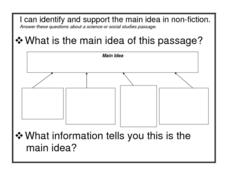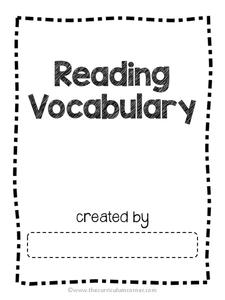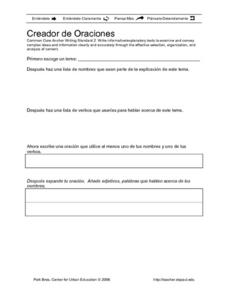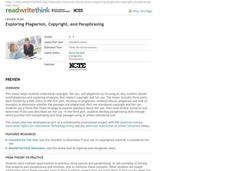Curriculum Corner
Informational Text Graphic Organizers
Scholars delve into an informational text with the help of four pages that focus on the author's purpose, vocabulary words, summarization, and main idea.
Curriculum Corner
Informational Text Graphic Organizers
Examine informational text with a three-page activity that focuses on taking notes, identifying the main idea, and locating supporting details in order to form a summary paragraph.
Curriculum Corner
Informational Text Graphic Organizers
Accompany informational text reading—independent or whole class—with a worksheet that challenges scholars to examine the text's main idea, details, take notes, and record vocabulary words and their meanings.
Lakeshorelearning
Read and Write about It
Reading informational text is a skill that transcends subjects and grade levels. Practice reading about different topics in various formats with a language arts lesson that includes opportunities for writing and research as well.
Polk Bros Foundation
How to Summarize a Non-Fiction Passage
After reading a text, one way to find out how much your class comprehended is to ask your pupils to summarize. This worksheet helps class members prepare for writing a summary of a nonfiction text. They note down the topic, up to eight...
Teach-nology
Author’s Purpose: Inform
Why does an author write an informative article? Learners examine passages of a short reading on Spain and determine what the author wanted to inform the reader about.
Polk Bros Foundation
I Can Identify a Nonfiction Writer's Main Idea and Supporting Examples
Use this page to quickly identify the central idea of a text and organize ideas for writing an informational or explanatory text. The worksheet is split into two parts. In the first part, pupils note down the main idea and supporting...
Curriculum Corner
Eric Carle Biography Organizer
Discover the life of renowned children's author, Eric Carle, with a biographical, graphic organizer. Scholars read an informational text and locate details such as Carle's birthday, siblings, favorite books, and write a reflection about...
T. Smith Publishing
Writing a Friendly Letter
Just because kids today are well-versed in texting and emails doesn't mean they shouldn't learn how to write a friendly letter! Reinforce their letter-writing skills with a lesson focused on the elements of a friendly letter, as...
Lerner Publishing
Meet the Dinosaurs
Take your class of youngsters on a prehistoric adventure with this four-lesson series on dinosaurs. Accompanying the Meet the Dinosaurs books by Don Lessem, these lessons engage children in writing their own dinosaur books,...
Do2Learn
Nonfiction Report
After reading an informational or biographical text, have learners fill out this worksheet to check for basic understanding. Pupils write down the title of the text, the topic, a brief description, and the purpose.
Polk Bros Foundation
A Way to Analyze Paragraphs to Figure Out the Main Idea of a Nonfiction Text
Shrink up a section by asking pupils to write down the main idea for each of seven paragraphs. There is a space provided for each main idea. When students have completed this portion, they write down what they think to be the central...
Edmond Public Schools
SOAPSTone
Break an article down with a SOAPSTone chart. Class members determine the speaker, occasion, audience, purpose, subject, and tone. The chart includes a question for each of these elements, provides some clarifying text for each, and...
Curated OER
Hanukkah - ESL
Reinforce vocabulary and reading comprehension with a Hanukkah-themed collection of worksheets. Scholars first read a two-paragraph informational text, then apply their new-found-knowledge to match phrases, fill in blanks with...
Polk Bros Foundation
I Can Locate and Classify Information About a Topic
After reading a text, ask your pupils to recall and organize what they've just learned into a blank three-column chart. Class members write the topic and fill in the columns with information. The sheet also prompts students to write a...
Polk Bros Foundation
I Can Identify and Support the Main Idea in Non-Ficiton
Analyze a historical or scientific informational text by determining the main idea and supporting details. This graphic organizer allows pupils to write down the main idea and four details.
California Education Partners
Vincent Van Gogh
Living in someone's shadow would be difficult for anyone, including one of the most talented artists of the modern age. Middle schoolers read an excerpt from Vincent Van Gogh: Portrait of an Artist by Jan Greenberg and Sandra Jordan...
Curriculum Corner
Academic Reading Vocabulary
From A to Z, learners define, draw, and find examples of specific reading focus skills in an alphabetized reading vocabulary packet. Words include dialogue, theme, text structure, genre, paraphrase, and many more.
Polk Bros Foundation
Meet the Nonfiction Main Idea Challenge
Help your class develop the ability to determine a main idea with a packet of materials that you can introduce and use over a period of time. The packet includes some information for the teacher and rationale for the exercises. There are...
Curated OER
Creador de Oraciones
Start by selecting a topic. What do you want your class to learn more about? Then, distribute this helpful note-taking guide. They record their topic, a list of names that could be associated with it, a list of verbs that come up when...
Curated OER
Identifying Text Structure #!
In this identifying graphic organizers and their texts worksheet, learners observe chronological, compare & contrast, sequence, cause & effect, and problem & solution graphic organizers, read short passages, and match them....
Curated OER
Reading a Comparison-Contrast Essay
Turn your passive readers into active readers with an engaging lesson on reading informational text. Focused on compare and contrast structured essays, the activity prompts elementary learners to jot down questions and think-aloud...
ReadWriteThink
Exploring Plagiarism, Copyright, and Paraphrasing
Plagiarism, copyright, and fair use are the focus of a three-part instructional activity designed to inform scholars of how to properly cite others' work. First, pupils use a KWL chart to begin thinking and...
California Education Partners
Eleven
It is difficult to articulate how growing up feels as accurately and beautifully as Sandra Cisneros does in her short story "Eleven." After seventh graders read the story and note the author's use of figurative language, they respond to...























